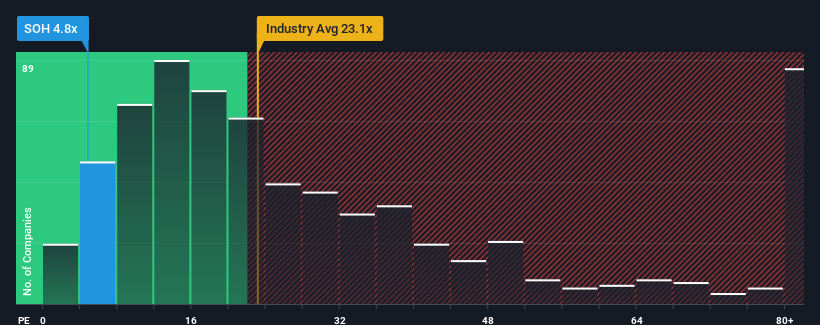- South Africa
- /
- Electrical
- /
- JSE:SOH
Benign Growth For South Ocean Holdings Limited (JSE:SOH) Underpins Stock's 27% Plummet

The South Ocean Holdings Limited (JSE:SOH) share price has softened a substantial 27% over the previous 30 days, handing back much of the gains the stock has made lately. Looking at the bigger picture, even after this poor month the stock is up 85% in the last year.
Since its price has dipped substantially, South Ocean Holdings may be sending very bullish signals at the moment with its price-to-earnings (or "P/E") ratio of 4.8x, since almost half of all companies in South Africa have P/E ratios greater than 10x and even P/E's higher than 16x are not unusual. Nonetheless, we'd need to dig a little deeper to determine if there is a rational basis for the highly reduced P/E.
With earnings growth that's exceedingly strong of late, South Ocean Holdings has been doing very well. One possibility is that the P/E is low because investors think this strong earnings growth might actually underperform the broader market in the near future. If you like the company, you'd be hoping this isn't the case so that you could potentially pick up some stock while it's out of favour.
Check out our latest analysis for South Ocean Holdings

What Are Growth Metrics Telling Us About The Low P/E?
In order to justify its P/E ratio, South Ocean Holdings would need to produce anemic growth that's substantially trailing the market.
Taking a look back first, we see that the company grew earnings per share by an impressive 37% last year. As a result, it also grew EPS by 18% in total over the last three years. Therefore, it's fair to say the earnings growth recently has been respectable for the company.
Comparing that to the market, which is predicted to deliver 16% growth in the next 12 months, the company's momentum is weaker based on recent medium-term annualised earnings results.
With this information, we can see why South Ocean Holdings is trading at a P/E lower than the market. Apparently many shareholders weren't comfortable holding on to something they believe will continue to trail the bourse.
The Bottom Line On South Ocean Holdings' P/E
Having almost fallen off a cliff, South Ocean Holdings' share price has pulled its P/E way down as well. While the price-to-earnings ratio shouldn't be the defining factor in whether you buy a stock or not, it's quite a capable barometer of earnings expectations.
As we suspected, our examination of South Ocean Holdings revealed its three-year earnings trends are contributing to its low P/E, given they look worse than current market expectations. At this stage investors feel the potential for an improvement in earnings isn't great enough to justify a higher P/E ratio. If recent medium-term earnings trends continue, it's hard to see the share price rising strongly in the near future under these circumstances.
Plus, you should also learn about these 3 warning signs we've spotted with South Ocean Holdings.
If these risks are making you reconsider your opinion on South Ocean Holdings, explore our interactive list of high quality stocks to get an idea of what else is out there.
If you're looking to trade South Ocean Holdings, open an account with the lowest-cost platform trusted by professionals, Interactive Brokers.
With clients in over 200 countries and territories, and access to 160 markets, IBKR lets you trade stocks, options, futures, forex, bonds and funds from a single integrated account.
Enjoy no hidden fees, no account minimums, and FX conversion rates as low as 0.03%, far better than what most brokers offer.
Sponsored ContentNew: Manage All Your Stock Portfolios in One Place
We've created the ultimate portfolio companion for stock investors, and it's free.
• Connect an unlimited number of Portfolios and see your total in one currency
• Be alerted to new Warning Signs or Risks via email or mobile
• Track the Fair Value of your stocks
Have feedback on this article? Concerned about the content? Get in touch with us directly. Alternatively, email editorial-team (at) simplywallst.com.
This article by Simply Wall St is general in nature. We provide commentary based on historical data and analyst forecasts only using an unbiased methodology and our articles are not intended to be financial advice. It does not constitute a recommendation to buy or sell any stock, and does not take account of your objectives, or your financial situation. We aim to bring you long-term focused analysis driven by fundamental data. Note that our analysis may not factor in the latest price-sensitive company announcements or qualitative material. Simply Wall St has no position in any stocks mentioned.
About JSE:SOH
South Ocean Holdings
An investment holding company, manufactures and distributes electrical wires in South Africa.
Adequate balance sheet slight.
Similar Companies
Market Insights
Community Narratives




